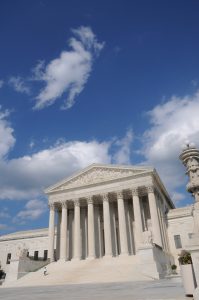The following post, by Robert R. Sachs, first appeared on the Bilski Blog, and it is reposted here with permission.
 It’s been one year since the Supreme Court’s decision in Alice Corp. v. CLS Bank. On its face the opinion was relatively conservative, cautioning courts to “tread carefully” before invalidating patents, and emphasizing that the primary concern was to avoid preemption of “fundamental building blocks” of human ingenuity. Read more
It’s been one year since the Supreme Court’s decision in Alice Corp. v. CLS Bank. On its face the opinion was relatively conservative, cautioning courts to “tread carefully” before invalidating patents, and emphasizing that the primary concern was to avoid preemption of “fundamental building blocks” of human ingenuity. Read more


 In an important decision handed down today, the Supreme Court explicitly recognized that patents are property secured by the Fifth Amendment Takings Clause. In
In an important decision handed down today, the Supreme Court explicitly recognized that patents are property secured by the Fifth Amendment Takings Clause. In  In the last two weeks, the House and Senate Judiciary Committees marked up wide-ranging patent legislation ostensibly aimed at combating frivolous litigation by so-called “patent trolls.” But while the stated purpose of the House and Senate bills—H.R. 9 (the “
In the last two weeks, the House and Senate Judiciary Committees marked up wide-ranging patent legislation ostensibly aimed at combating frivolous litigation by so-called “patent trolls.” But while the stated purpose of the House and Senate bills—H.R. 9 (the “